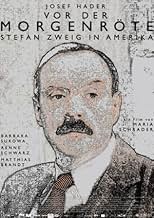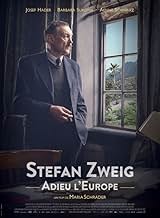PUNTUACIÓN EN IMDb
6,7/10
2,7 mil
TU PUNTUACIÓN
"Before Dawn" narra los años de exilio del famoso escritor judío austriaco Stefan Zweig, su lucha interior por la "actitud correcta" ante los acontecimientos de la guerra que desgarró Europa... Leer todo"Before Dawn" narra los años de exilio del famoso escritor judío austriaco Stefan Zweig, su lucha interior por la "actitud correcta" ante los acontecimientos de la guerra que desgarró Europa, y su búsqueda de un nuevo hogar."Before Dawn" narra los años de exilio del famoso escritor judío austriaco Stefan Zweig, su lucha interior por la "actitud correcta" ante los acontecimientos de la guerra que desgarró Europa, y su búsqueda de un nuevo hogar.
- Premios
- 6 premios y 10 nominaciones en total
Argumento
¿Sabías que...?
- CuriosidadesOfficial submission of Austria for the 'Best Foreign Language Film' category of the 89th Academy Awards in 2017.
- ConexionesFeatured in Women Make Film (2018)
- Banda sonoraThe Blue Danube Waltz
Composed by Johann Strauss
Reseña destacada
'Stefan Zweig: Farewell to Europe' is a movie which, although a good one, left me slightly unsatisfied. I was interested, at times impressed, at others amused by Maria Schrader's film, but in the end, not totally conquered.
* Interested because Zweig is among my favorite writers and my being given the opportunity to revisit his life and ideas (even if in a restricted manner like here) could not possibly leave me indifferent. Moreover the cast, composed of Austrian, German and Portuguese actors, is chosen to perfection. Josef Hader embodies the great writer most convincingly and Barbara Sukowa as Friderika, his ex-wife, is her usual competent self. As for Aenne Schwarz, she reveals an engaging personality as Lotte, Stefan's second wife. * Impressed by the virtuosity of director Schrader (the dazzling opening sequence set at the Jockey Club ; the closing one leaving the vision of Zweig and Lotte's dead bodies off-camera except for a transient reflection in the mirror of a wardrobe). * Amused by the indescribable humor of the long sequence staging the botched reception of Stefan and Lotte in a remote village of Bahia State, the plump henpecked mayor delivering a clumsy address under the control of his domineering wife, followed by the harrowing performance of a local brass band striking up to play one of the worst versions of "The Blue Danube" ever to be heard. A comical episode but in no way gratuitous insofar as it reinforces the notion that Zweig is in awkward position, at once fascinated by his adopted country and lost in deep, irremediable uprooting.
So what accounts for the slight feeling of insatisfaction that was mine after viewing the film: too many speeches perhaps (what is indeed less humane than these exercises in rhetoric convincing only the convinced and leaving the others listening distractedly and yawning discreetly ?); the narrative process chosen (Zweig's life from 1936 to 1942 presented in five barely related episodes and an epilogue) not allowing to know Zweig intimately enough? For example, I would have liked to know on what grounds Zweig had divorced Friderika, how he formed a new couple with Lotte, how Stefan persuaded Lotte to follow him in death... I dare say that to avoid being accused of making a merely illustrative biopic told in chronological order (the critics' latest pet aversion), some filmmakers tend to uselessly break down temporality. This is precisely what, in my case, lessened the emotional impact of this otherwise thought-provoking film. A little more continuity would have resulted in a little more adherence to the story and its characters, a must-be when one deals with such a connoisseur of the human soul as Zweig.
But those are only reservations, not a rejection of the movie. Even with what I consider its shortcomings (not everybody's point of view for that matter, 'Stefan Zweig: Farewell to Europe' remains a respectable work, which will not make you waste your time.
* Interested because Zweig is among my favorite writers and my being given the opportunity to revisit his life and ideas (even if in a restricted manner like here) could not possibly leave me indifferent. Moreover the cast, composed of Austrian, German and Portuguese actors, is chosen to perfection. Josef Hader embodies the great writer most convincingly and Barbara Sukowa as Friderika, his ex-wife, is her usual competent self. As for Aenne Schwarz, she reveals an engaging personality as Lotte, Stefan's second wife. * Impressed by the virtuosity of director Schrader (the dazzling opening sequence set at the Jockey Club ; the closing one leaving the vision of Zweig and Lotte's dead bodies off-camera except for a transient reflection in the mirror of a wardrobe). * Amused by the indescribable humor of the long sequence staging the botched reception of Stefan and Lotte in a remote village of Bahia State, the plump henpecked mayor delivering a clumsy address under the control of his domineering wife, followed by the harrowing performance of a local brass band striking up to play one of the worst versions of "The Blue Danube" ever to be heard. A comical episode but in no way gratuitous insofar as it reinforces the notion that Zweig is in awkward position, at once fascinated by his adopted country and lost in deep, irremediable uprooting.
So what accounts for the slight feeling of insatisfaction that was mine after viewing the film: too many speeches perhaps (what is indeed less humane than these exercises in rhetoric convincing only the convinced and leaving the others listening distractedly and yawning discreetly ?); the narrative process chosen (Zweig's life from 1936 to 1942 presented in five barely related episodes and an epilogue) not allowing to know Zweig intimately enough? For example, I would have liked to know on what grounds Zweig had divorced Friderika, how he formed a new couple with Lotte, how Stefan persuaded Lotte to follow him in death... I dare say that to avoid being accused of making a merely illustrative biopic told in chronological order (the critics' latest pet aversion), some filmmakers tend to uselessly break down temporality. This is precisely what, in my case, lessened the emotional impact of this otherwise thought-provoking film. A little more continuity would have resulted in a little more adherence to the story and its characters, a must-be when one deals with such a connoisseur of the human soul as Zweig.
But those are only reservations, not a rejection of the movie. Even with what I consider its shortcomings (not everybody's point of view for that matter, 'Stefan Zweig: Farewell to Europe' remains a respectable work, which will not make you waste your time.
- guy-bellinger
- 8 oct 2016
- Enlace permanente
Selecciones populares
Inicia sesión para calificar y añadir a tu lista para recibir recomendaciones personalizadas
- How long is Stefan Zweig: Farewell to Europe?Con tecnología de Alexa
Detalles
- Fecha de lanzamiento
- Países de origen
- Sitio oficial
- Idiomas
- Títulos en diferentes países
- Stefan Zweig: Adeu a Europa
- Localizaciones del rodaje
- São Tomé e Príncipe(Bahia, Brazil)
- Empresas productoras
- Ver más compañías en los créditos en IMDbPro
Taquilla
- Recaudación en Estados Unidos y Canadá
- 78.372 US$
- Fin de semana de estreno en EE. UU. y Canadá
- 11.729 US$
- 14 may 2017
- Recaudación en todo el mundo
- 1.370.772 US$
- Duración1 hora 46 minutos
- Color
- Relación de aspecto
- 2:39
Contribuir a esta página
Sugerir un cambio o añadir el contenido que falta

Principal laguna de datos
By what name was Stefan Zweig: Adiós a Europa (2016) officially released in Canada in English?
Responde




































